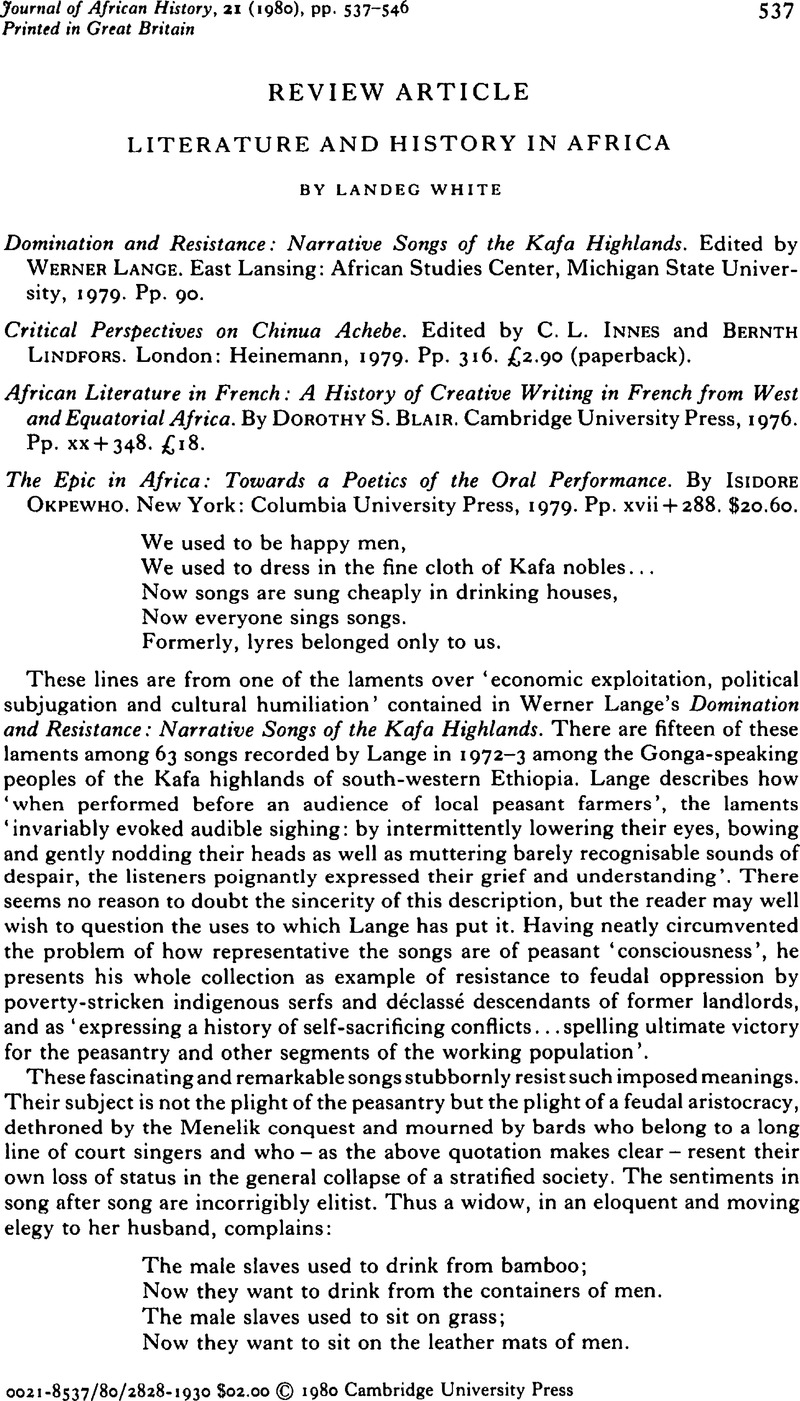Published online by Cambridge University Press: 22 January 2009

1 There is, of course, an argument but it has centred on the ethnic qualifications of the critic. ‘On the matter, for instance, of who is most competent to criticise what I am amazed to find is that the origins of a critic seem sometimes more important to the discussion than his actual performance. In a scene rife with veiled ethnic wars, the Igbo critic feels duty bound to defend and uphold Igbo writers; the Yoruba critic feels duty bound to attack, or at least to slight, the works of any Igbo writer; furthermore, an Oshogbo man, it is felt, is congenitally barred from competence to, and should not dare to criticise the work of a Shagamu woman; and (effrontery of effronteries!) why should a non-African, especially a European, dare criticise an African writer?’ Chinweizu, , review article, ‘African Literary Criticism Today’, Okike, ix (Dec. 1975), 89–105.Google Scholar
2 It is noteworthy that no modern Igbo historian finds it necessary or useful to refer to Achebe's historical novels in describing nineteenth-century life in the Niger delta.
3 Obumselu, B., ‘Chinua Achebe's African aesthetic: a reconsideration of A Man of the People’, The English Teachers Journal, i, ii (English Teachers Association of Zambia, Dec. 1977), 13–20.Google Scholar
4 See especially Finnegan, Ruth, Oral Literature in Africa (Oxford, 1970), 26–80Google Scholar, and Andrzejewski, B. W. and Innes, G., ‘Reflections onx African Oral Literature’, African Languages, 1 (1975), 5–57.Google Scholar
5 Andrzejewski and Innes, loc. cit., 8.
6 Muir, Kenneth, The Sources of Shakespeare's Plays (Methuen, 1977), 41.Google Scholar
7 See, for example, Knappert, Jan, Four Centuries of Swahili Verse. London: Heinemann Educational Books, 1979.Google Scholar £10.50 (£4.95 paperback).
8 ‘Contemporary cultural studies: an approach to the study of literature and society’, by Hoggart, Richard, in Contemporary Criticism, Edited by Bradbury, M. and Palmer, D. (Edward Arnold, 1970), 162.Google Scholar
9 Cope, T., Izibongo: Zulu Praise Poems (Oxford, 1968), 50–63Google Scholar, summarizing ‘An Analytical Survey of Zulu Poetry’, by Kunene, R. (unpub. M.A. thesis, University of Natal, 1962).Google Scholar
10 The difference will be considerable in the case of the novels of James Hadley Chase, apparently Africa's best-selling author, but insignificant in the case of the Mozambican ‘Paiva’ song which is valued by the people of the lower Zambesi as ‘a map’ of their experiences. See ‘Plantation protest: the history of a Mozambican song’, by Vail, Leroy and White, Landeg, Journal of Southern African Studies, v, i (1978), 1–25.CrossRefGoogle Scholar
11 Sung by John, Magileti and Kapitão, Edina of Chayoneka Village, near Thyolo, Malawi, 29 Dec. 1970Google Scholar, in ‘Traditional Malawi Music’, unpub. MSS collection in University of Malawi Library, Zomba (1970–71), no pagination.
12 See also Biebuyck, D., Hero and Chief. Epic Literature from the Banyanga (Zaïre Republic). Berkeley, Los Angeles and London: University of California Press, 1978Google Scholar, $20; Clark, J. P. (collector and translator), The Ozidi Saga. Ibadan University Press and Oxford University Press, 1979Google Scholar, £19.95.
13 Finnegan, , Oral Literature, 518.Google Scholar